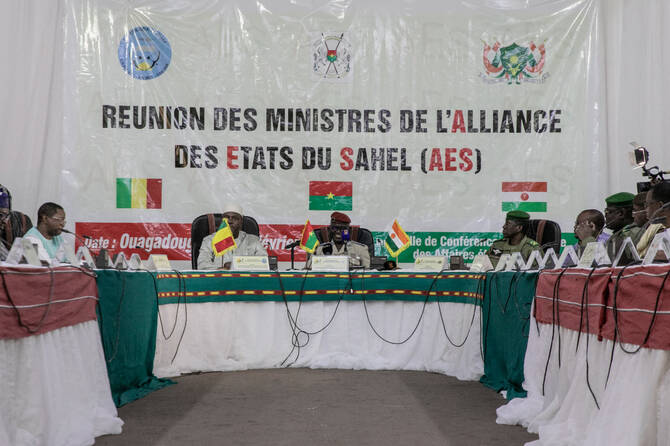
A diplomatic crisis has erupted between Algeria and the three core members of the Sahel Alliance Mali, Niger, and Burkina Faso amid heightened security challenges and contrasting foreign policy agendas in the region. The Sahel, a vast semi-arid belt stretching across Africa, has become a hotspot for insurgencies, extremist groups, and violent extremism, raising serious concerns about regional stability and the effectiveness of international responses.
The diplomatic rift emerged after Algeria expressed increasing dissatisfaction with the Sahel Alliance’s handling of the security situation and its growing cooperation with external actors, notably Western powers and the United Nations. The Alliance, established to foster greater regional cooperation against terrorism and violent extremism, includes Algeria’s neighboring countries, Mali, Niger, and Burkina Faso. Over the past several years, these countries have experienced escalating attacks from jihadist groups, including al-Qaeda and ISIS affiliates, making the Sahel one of the most volatile regions in Africa.
Algeria, which has long positioned itself as a key player in regional security and diplomacy, has voiced concern that the Sahel Alliance has been increasingly sidelining its role and allowing foreign intervention, particularly from former colonial powers such as France. Algeria’s government has repeatedly stated that it prefers a solution to the region’s security challenges that is entirely African-led, with minimal involvement from external military forces. The Algerian leadership believes that the Sahel Alliance’s collaboration with Western countries compromises the region’s sovereignty and undermines local efforts to stabilize the situation.
The crisis deepened when Algeria accused Mali, Niger, and Burkina Faso of prioritizing foreign military assistance over regional cohesion and self-sufficiency. Algeria’s Ministry of Foreign Affairs issued a statement condemning what it perceived as a shift towards accepting military and logistical support from Western countries, which it believes exacerbates regional instability.
The Sahel Alliance, on the other hand, has argued that external support is necessary due to the complexity and scale of the security challenges. For the countries directly affected by extremist violence, the Sahel Alliance is seen as a necessary mechanism for coordinating international assistance and mobilizing resources to combat terrorism. Niger, Mali, and Burkina Faso have each sought support from France and the European Union to provide military aid and counterterrorism operations, including the French-led Operation Barkhane, which was scaled back last year following rising anti-French sentiment in the region.
In contrast, Algeria has called for a shift toward regional-led solutions, emphasizing the role of the African Union (AU) and the G5 Sahel, an organization designed to tackle common security threats among the Sahelian countries. Algeria’s position has caused increasing friction with Mali, Niger, and Burkina Faso, which feel that their cooperation with Western partners is critical to combating terrorist organizations that threaten their governments’ survival.
The situation has also been exacerbated by Algeria’s growing isolation from the region’s political shifts. The rise of military juntas in Mali, Burkina Faso, and Niger—resulting from coups that ousted pro-Western leaders—has led to shifting allegiances. The new regimes have expressed dissatisfaction with the presence of French and UN forces, calling for a rethinking of foreign intervention in the Sahel. These moves align with Algeria’s stance that foreign involvement often exacerbates rather than solves the region’s deep-rooted issues.
The increasing ties between Mali, Burkina Faso, and Niger with Russia, particularly through the Wagner Group’s presence in the region, further alienates Algeria, which has remained cautious about Russia’s expanding influence in Africa. While Algeria maintains a policy of non-intervention and neutrality regarding international conflicts, its increasing distaste for foreign influence and the rise of anti-Western sentiment in the Sahel is putting it at odds with its southern neighbors.
The diplomatic fallout between Algeria and the Sahel Alliance countries has raised serious concerns about regional cooperation in the fight against extremism and organized crime. While the three Sahelian nations continue to move closer to Russia and reject French military assistance, Algeria’s preference for an African-led approach places it at odds with the shifting priorities of its neighbors.
This deepening divide could have profound consequences for regional stability. Without coordinated efforts, the Sahel risks further fragmentation, with individual countries seeking assistance from various external powers, potentially leading to a fragmented and ineffective approach to combating the complex challenges posed by terrorist groups and armed militias.
As the diplomatic standoff between Algeria and its neighbors continues to unfold, the future of the Sahel’s security framework appears uncertain. While there is still potential for dialogue and reconciliation, the growing influence of external powers like Russia and China in the region and the evolving geopolitical landscape of Africa may limit Algeria’s ability to maintain its traditional role as a regional mediator.
For now, the countries of the Sahel Alliance must navigate a delicate balance between internal sovereignty and external support, while Algeria must find ways to reassert its influence and protect its interests without further alienating its neighbors. The region’s stability, and its ability to confront the persistent threat of violent extremism, will depend on how these nations choose to manage their differences in the coming months.
In the end, the diplomatic crisis between Algeria and the Sahel Alliance countries underscores the fragile nature of African unity and the complexities of securing peace and stability in one of the world’s most troubled regions.

